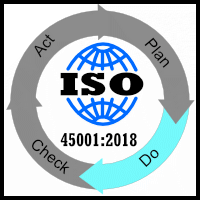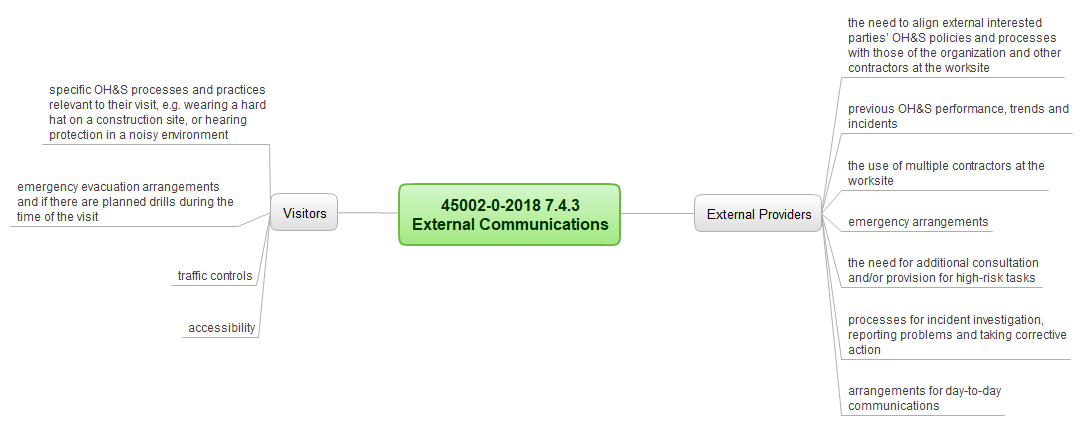|
|
ISO 45001-2018 7.4 CommunicationSend comments on this topic |
FREE QHSE Software Click <HERE> to Learn More |
||
QHSE Support >(Site Map) Health & Safety Guidance > ISO 45001:2018 Clauses > ISO 45001:2018 clause 7 >
ISO 45001:2018 Clause 7.4 Communication
|
PLAN |
DO |
CHECK |
ACT |
Clause 7.4 Breakdown
7.4 Communication
7.4.1 General
7.4.2 Internal communication
7.4.3 External communication
With clause 7.4, we are dealing with internal and external communications relevant to the OH&S management system.
This clause should not pose too much of a problem as most organizations will have well-established lines of communications even if not formally documented to the level required by ISO 45001 2018. However, addressing this should be easy. Organizations with poor communications inadvertently run into business problems and eventually fail.
Whilst good to have a handle on all the organization's communications, it is not necessary to comply with ISO 45001 2018.
Therefore with regards to internal and external communications, the OH&S management system needs to establish, implement, and maintain processes to determine:
•what's required to be communicated?
•When it is required to be communicated?
•How is it to be communicated?
•Who needs to see the communiqué? With consideration to both internal and external employees, contractors, visitors etc.
Deciding how to communicate needs a little bit of thought, will the communiqué be clearly understood by all staff or will different languages need to be considered for foreign nationals and seasonal workers, where written communications may not always be the most appropriate method? The level of detail also needs to be considered, typically technical, skilled staff and middle to lower management will require more detailed communications, whereas higher management and general workers may require no more than an appraised version. However, the organization decides to communicate it needs to be consistent in its delivery and methodology to achieve homogeneous and logical results.
It's important to remember that the requirements of clause 7.4 is one that needs to be retained as documented information (see clause 7.5), this also includes the OH&S management system for receiving and responding to external communications.
The general guidance document ISO 45002-0-2018 of the standard includes a list of topics that internal communications should cover, invariably auditors will choice to drill down into these areas.
the top management's commitment to its OH&S management system;
the system for raising concerns and/ or making suggestions;
the OH&S policy, and how it is disseminated throughout the organization;
the identification of hazards and risks;
OH&S objectives and actions to achieve them;
progress in eliminating OH&S hazards and associated OH&S risks;
any changes that may impinge the OH&S management system; and
incident investigations and resulting actions
Some methods of internal communications could include:
•Memos,
•Presentations,
•Newsletters,
•Posters,
•Notice boards,
•Suggestion box,
•Meetings, (management, safety, quality, reviews etc)
•Toolbox Talks,
•Training Courses,
•Site inductions,
•Briefings,
•Focus groups,
•E-mails,
•Faxes,
•Company Intranet,
•Company Web-pages.
However the organizations decides to manage its internal OH&S communications there needs to be a degree of evidence its actually happening retained documented information.
The standard is brief on external communications, requiring organizations to establish OH&S communications, bearing in mind its legal and other requirements. However, the general guidance document ISO 45002-0-2018 of the standard provides much more detail in the areas that potentially need addressing to meet this clause.
External parties can be wide-ranging, including the likes of:
•contractors,
•sub-contractors,
•agency staff,
•visitors,
•neighbouring communities,
•stake-holders.
•compliance authorities and bodies,
•emergency response services,
•delivery service staff,
•utility service staff,
and many more.
The way an organization chooses to communicate with external parties depends on how intrusive their requirement is upon the organization and the level of risk they may face.
Delivery service staff - can be marshalled and controlled in designated areas.
Visitors - can be designated to specified areas and departments.
Contractors - may require access to more specific areas.
Emergency services - may well like to have site-wide access.
Managing OH&S communication with external parties depends upon their requirements and the risks they import. For sure, there will be some generic requirements across all parties, e.g. accident reporting, emergency evacuation. Equally, there will also be requirements that many parties will not need to know. It is also necessary to ensure changes to the OH&S are communicated asap to those affected by the changes, and where necessary, incorporated into the organization's external communication systems.
Document ISO 45002-0-2018 lists a number of areas to be considered when communicating with external providers and visitors;
The use of signage and posters to communicate and direct visitors, delivery staff, members of the public etc., can be effective. The use of pictograms may be favourable in today's open borders and multicultural societies, where you cannot assume people will be able to read signs in languages, not of their native tongue.
Useful integrated management system cross references
ISO 9001
•ISO 9001-2105 7.4 Communication
ISO 14001
•ISO 14001-2015 7.4 Communication
Help file v2.276.407 : QHSE Support - Website On Safe Lines
onsafelines.com QHSE Software 2025 : Webmaster: Brian G. Welch MSc(QHSE), NVQ4(OH&S), CMIOSH




